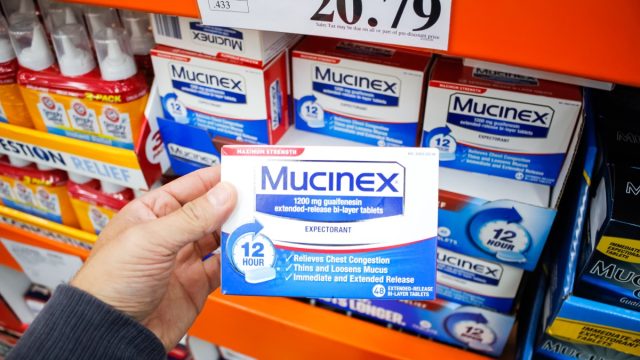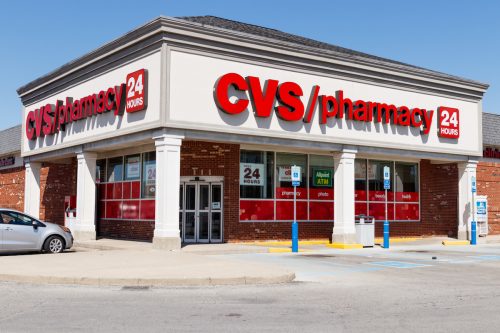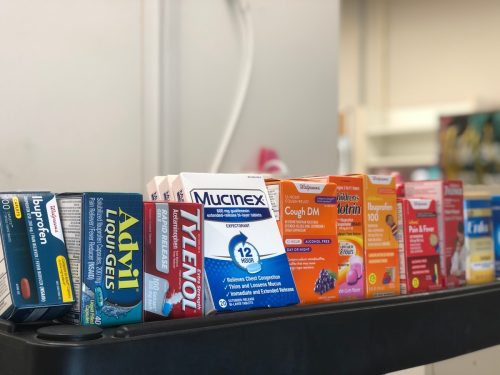Mucinex Is Being Pulled From Pharmacy Shelves, Outraged Shoppers Claim

It’s that time of year again: The weather has turned and everyone seems to be getting the sniffles or a nasty cough. Rather than going to the doctor for a common cold or allergies, many of us turn to over-the-counter (OTC) treatments that we get from the local pharmacy. But earlier this year, the U.S. Food and Drug Administration (FDA) ruled that certain products actually aren’t effective—prompting them to be removed from shelves. Now, customers claim that Mucinex is the latest to be pulled, sparking outrage on social media. Read on to find out why shoppers are concerned.
RELATED: 8 Popular Cold Meds at Risk of Being Banned After New FDA Ruling.
The FDA recently discussed a common ingredient in OTC meds.

In September, the FDA Nonprescription Drug Advisory Committee determined that phenylephrine—the main ingredient in many OTC cold and cough products—doesn’t actually work as a nasal decongestant.
“The committee discussed new data on the effectiveness of oral phenylephrine and concluded that the current scientific data do not support that the recommended dosage of orally administered phenylephrine is effective as a nasal decongestant,” a release from the agency reads. “However, neither FDA nor the committee raised concerns about safety issues with use of oral phenylephrine at the recommended dose.”
The agency hasn’t officially deemed phenylephrine “not effective” or removed it as an ingredient that the FDA generally recognizes as safe and effective (GRACE), which would require several additional steps and a public comment period. In addition, the agency clarified that the discussion was only surrounding orally administered phenylephrine, not the form used in nasal sprays to treat congestion.
RELATED: FDA Investigating Common Cold Meds: These “Should Never Be Used,” Doctors Warn.
There’s no official guidance on phenylephrine just yet, but CVS took action last month.

The FDA has yet to ask drug manufacturers and retailers to remove products containing oral phenylephrine, but last month, CVS Pharmacy took it upon itself to remove some of these medications.
“We are aware of the FDA Advisory Committee’s position on oral phenylephrine (PE) and will follow direction from the FDA to ensure products we sell comply with all laws and regulations,” a CVS spokesperson said in a statement to Best Life. “We are removing a small number of oral decongestant products that contain phenylephrine as the only active ingredient from CVS Pharmacy stores but will continue offering many other oral cough and cold products to meet consumer.”
In October, The Wall Street Journal reported that Sudafed PE is among the oral products that list phenylephrine as the only active ingredient, but now, shoppers claim that Mucinex is missing from pharmacy shelves as well.
RELATED: FDA Warns Common Soda Ingredient Is Toxic to Your Thyroid.
Some customers are promoting a conspiracy theory.

Some shoppers on X shared their thoughts on Mucinex, alleging that it’s no longer being sold—and arguing that there may be different motivations for removing phenylephrine products.
“My daughter was recently sick and the doc said take Mucinex, but the FDA says Mucinex doesnt help with colds now? Something isn’t right,” a Nov. 12 post reads, linking to a post that alleges there is a “larger plan” to get rid of medications that might help relieve COVID-19 symptoms.
In additional tweets, there were allegations about the removal of cold medicines and how that may be related to recommendations surrounding the latest COVID booster. One wrote, “It took the FDA 20 years to actually realize Mucinex is not effective for its intended use. But the newly discovered Covid vaccines they promote AND sell, are effective.”
Back in October another suggested, “Unreal. CVS is removing cold medicine from shelves under direction from the FDA…which calls it ‘ineffective.’ Supplements and symptom reducers are now under attack, but they still want you to take the jab.”
Don’t panic about missing Mucinex just yet.

While some are up in arms and worried about the removal of their go-to medication, the FDA hasn’t made a formal decision—and CVS’ actions last month exclusively applied to products with phenylephrine as the only active ingredient. In an email to Best Life, the CVS spokesperson did not provide specific information about Mucinex or plans to remove these products, only confirming that the company’s previous statement remains accurate.
Many shoppers pointed out that the current social media uproar is uncalled for, as Mucinex products are, in fact, still on shelves.
“Gee, Mucinex was supposedly pulled from shelves. What do I see on Amazon, Walgreens, Kroger? Mucinex. Kroger has a sale on it this week. Conspiracy theorists: Creating a problem that doesn’t exist to look smarter than they can never be,” a Nov. 13 X post reads.
Additionally, while Mucinex’s website confirms phenylephrine as an ingredient, according to GoodRx, the main ingredient in most of Mucinex’s OTC products is actually guaifenesin, which helps loosen mucus so you can cough it up.
RELATED: For more up-to-date information, sign up for our daily newsletter.
Best Life offers the most up-to-date information from top experts, new research, and health agencies, but our content is not meant to be a substitute for professional guidance. When it comes to the medication you’re taking or any other health questions you have, always consult your healthcare provider directly.